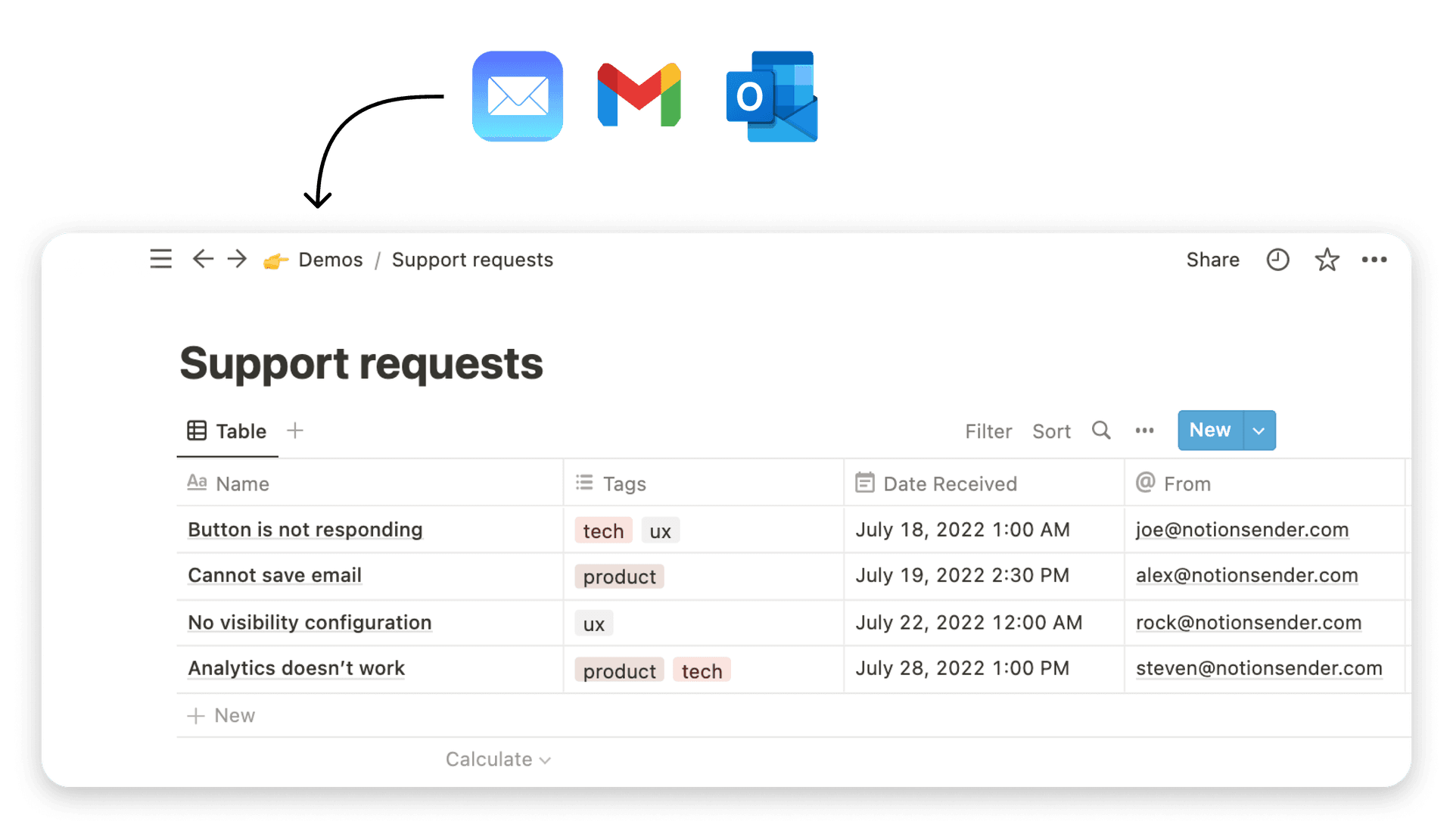12 Best database software for small business You Should Know

Finding the best database software for small business can feel like searching for a needle in a haystack. The market is saturated with options ranging from simple, user-friendly platforms to complex, developer-centric systems. How do you determine which one truly fits your specific needs for customer management, inventory tracking, or project organization without wasting valuable time and resources on trial and error?
This guide cuts through the noise. We provide a direct, comprehensive comparison of the top database solutions tailored for small business operations. Whether you're a project manager needing a visual way to track tasks, a freelance marketer managing client data, or a business owner looking to build a custom application without writing code, the right tool is in this list. We'll move beyond generic marketing descriptions and dive into practical applications.
Our goal is to help you make an informed decision quickly. For each platform, you will find:
- A concise overview of what it does best.
- Honest pros and cons based on real-world use cases.
- Clear pricing information to fit your budget.
- Screenshots and direct links to get you started immediately.
We’ve analyzed everything from no-code builders like Airtable and Zoho Creator to robust, scalable cloud services such as Amazon RDS and traditional powerhouses like Microsoft Access. This resource is designed to be your final stop in selecting the database software that will help your business organize data, streamline workflows, and ultimately, grow more efficiently. Let’s explore the options.
1. Send and receive emails in Notion | NotionSender
NotionSender distinguishes itself by transforming the popular productivity tool, Notion, into a dynamic, email-integrated database system. It stands out as an exceptional choice for small businesses already embedded in the Notion ecosystem, effectively eliminating the barrier between project management and client communication. By assigning unique email addresses to any Notion database, it automates the capture of inquiries, support tickets, or sales leads directly into a structured environment, turning a versatile workspace into a powerful, centralized business hub.
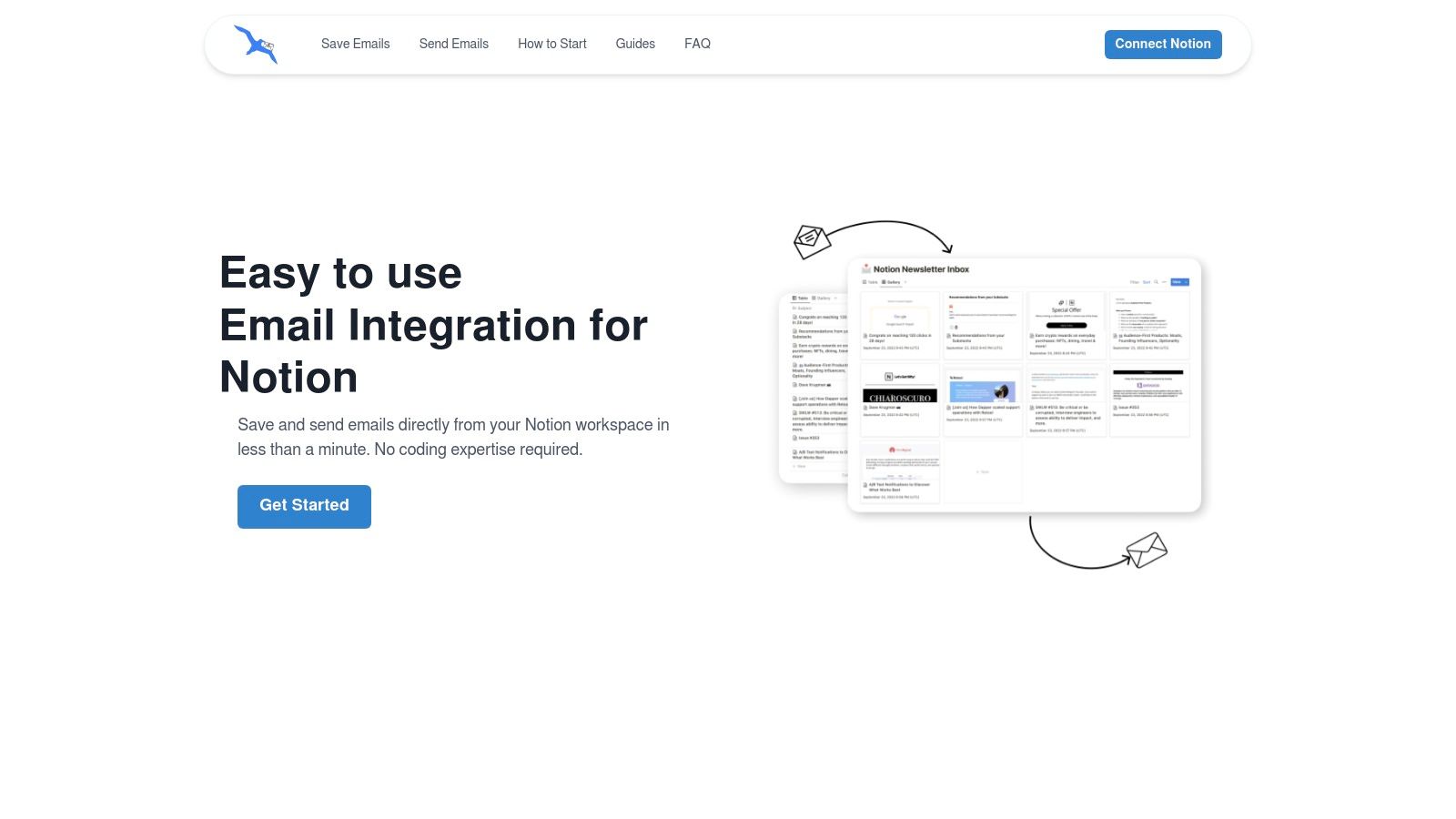
What makes NotionSender a premier contender for the best database software for small business is its intelligent data parsing. The platform uses AI to automatically analyze incoming emails, intelligently extracting and populating key information like sender details, subject, attachments, and specific content into relevant database fields. This single feature drastically reduces manual data entry, minimizes human error, and ensures that every piece of client communication is logged and actionable.
Key Features & Use Cases
NotionSender excels in creating streamlined, automated workflows that are highly valuable for resource-constrained small businesses.
- Lightweight CRM: Manage customer relationships by automatically creating a new database entry for each new client email. Track communication history, log attachments like invoices or project briefs, and manage follow-ups all within a single, organized view.
- Support Ticket System: Designate a specific Notion database to handle customer support. When a user emails
support@yourcompany.notionsender.com, a ticket is automatically created, assigned, and tracked through to resolution. - Project Management Hub: Forward project-related emails from clients or team members directly into the relevant project database. This consolidates all communications and files, ensuring nothing gets lost in scattered email inboxes.
- Email Automation: Go beyond receiving emails. You can send automated responses, schedule follow-ups, and use personalized templates directly from Notion, making it a comprehensive communication tool. For developers looking to build custom integrations, the platform's API documentation offers extensive guidance. You can learn more about building with the NotionSender API.
Pricing & Implementation
- Free Plan: Includes 100 emails per month and 1 database address.
- Pro Plan: Starts at $19/month for 1,000 emails/month, unlimited databases, and AI parsing.
- Business Plan: $49/month for 5,000 emails/month, priority support, and team features.
Implementation is straightforward. Users simply connect their Notion account, select a database, and are assigned a unique email address for it. The user interface is clean and integrates seamlessly into the familiar Notion environment.
Pros:
- Seamlessly merges email management with Notion's database capabilities.
- AI-powered data parsing significantly reduces manual entry.
- Enables powerful, customized workflows for CRM, support, and more.
- Centralizes communication, reducing the need to switch between apps.
Cons:
- Best suited for businesses already using Notion.
- AI parsing may occasionally require manual correction for complex emails.
Website: https://www.notionsender.com/
2. Microsoft Access
Microsoft Access remains a powerhouse for small businesses that need a robust, desktop-based relational database without the complexity and cost of a server-based system. It shines in creating custom applications for internal use, like inventory management, customer relationship tracking, or project management tools, directly on a Windows PC. Its main advantage is the rapid application development (RAD) environment, allowing users with moderate technical skills to build functional database applications complete with forms for data entry, complex queries, and professional-looking reports.
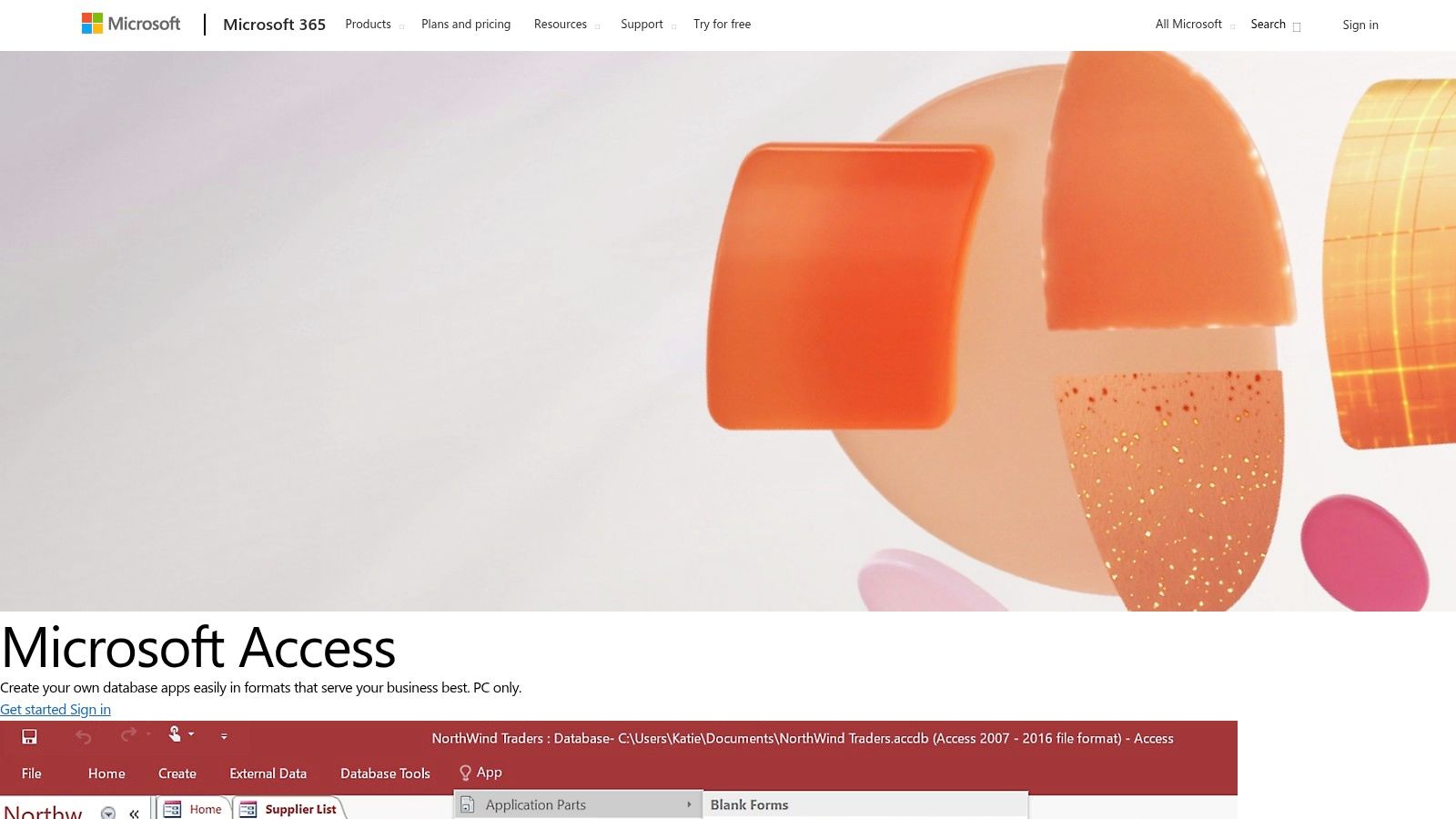
As part of the Microsoft ecosystem, Access offers unparalleled integration with other Office products, especially Excel and Outlook. This makes importing existing data from spreadsheets or exporting reports a seamless process. For small teams, it's a practical step up from managing data in Excel, providing better data integrity, querying capabilities, and multiuser access within a local network.
Key Features & Use Cases
Access is an excellent choice for a variety of small business needs. Its comprehensive toolset allows you to manage data far more effectively than a simple spreadsheet.
- Best For: Departmental applications, inventory tracking, contact management, and creating simple, internal business apps.
- Visual Designers: Easily build tables, queries, forms, and reports using drag-and-drop interfaces.
- VBA Automation: Automate complex workflows and tasks using Visual Basic for Applications, a powerful scripting language.
- Data Connectivity: Natively connects to SQL Server, Azure SQL, and SharePoint lists, allowing it to act as a front-end for more powerful backend databases as your business grows.
Pricing and Access
Microsoft Access is available through Microsoft 365 Business Standard subscriptions (starting at $12.50/user/month) or as a standalone purchase. This accessibility makes it a cost-effective option for businesses already invested in the Microsoft Office suite.
Website: https://www.microsoft.com/en-us/microsoft-365/access/
3. Claris FileMaker
Claris FileMaker is a powerful low-code platform that empowers small businesses to create and deploy custom apps tailored to their unique operational needs. It bridges the gap between simple spreadsheets and complex enterprise systems, allowing users to build sophisticated applications for inventory, CRM, and project management that run seamlessly across macOS, Windows, iOS, and web browsers. Its key strength lies in its rapid development environment, where business logic and user interfaces can be built visually, dramatically reducing development time compared to traditional coding.
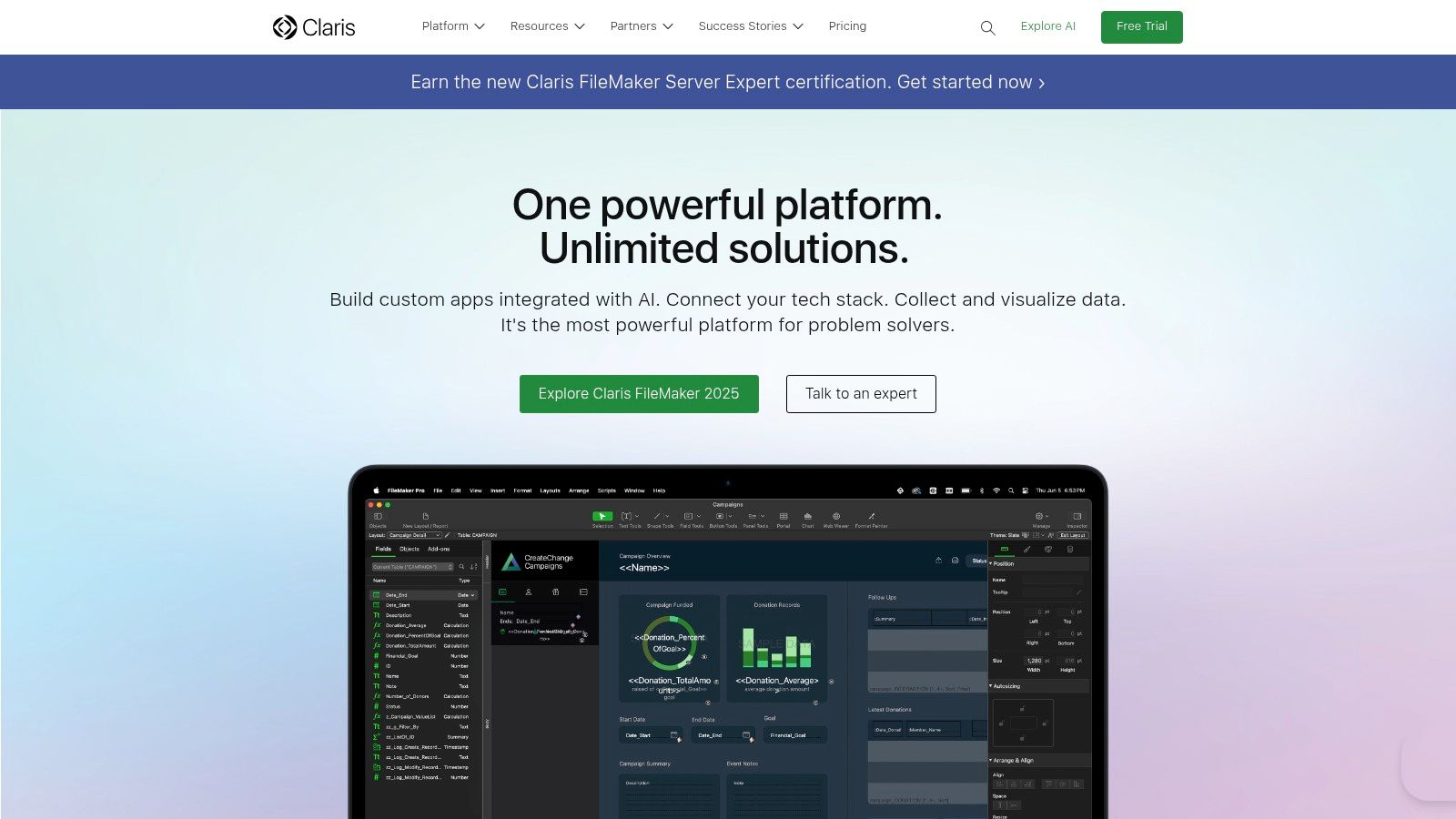
This makes it one of the best database software for small business teams who need a fully customized solution without a dedicated development team. The platform offers the flexibility of on-premises hosting via FileMaker Server or a hassle-free cloud option with FileMaker Cloud, giving businesses control over their data and infrastructure. This choice, combined with its robust relational data model and cross-platform capabilities, makes FileMaker a mature and stable choice for creating mission-critical business applications.
Key Features & Use Cases
FileMaker's integrated toolset is ideal for building custom solutions that solve specific business problems, from client management to field service operations.
- Best For: Creating custom cross-platform business apps, mobile workforce solutions, and centralized data management systems.
- Visual App Building: Design custom layouts, automate workflows with scripts, and define complex relational data models using an intuitive graphical interface.
- Cross-Platform Deployment: Build an app once and deploy it natively on desktops (macOS, Windows), mobile devices (iOS via FileMaker Go), and web browsers (via WebDirect).
- Robust Integrations: Connect to other services and systems using the built-in Claris Connect platform or by leveraging its support for REST APIs.
Pricing and Access
Claris FileMaker is available through annual licensing, with plans typically starting around $21/user/month for team bundles. Single licenses are also available for individual developers. The total cost depends on the number of users and the chosen deployment method (self-hosted or cloud).
Website: https://www.claris.com/
4. Airtable
Airtable brilliantly blurs the line between a powerful relational database and a user-friendly spreadsheet, making it one of the best database software choices for small businesses prioritizing flexibility and collaboration. It’s a cloud-based platform that allows teams to build custom applications and workflows without writing a single line of code. Its strength lies in its visual and intuitive approach to data management, empowering non-technical users to organize everything from marketing campaigns and content calendars to light CRM and project tracking.
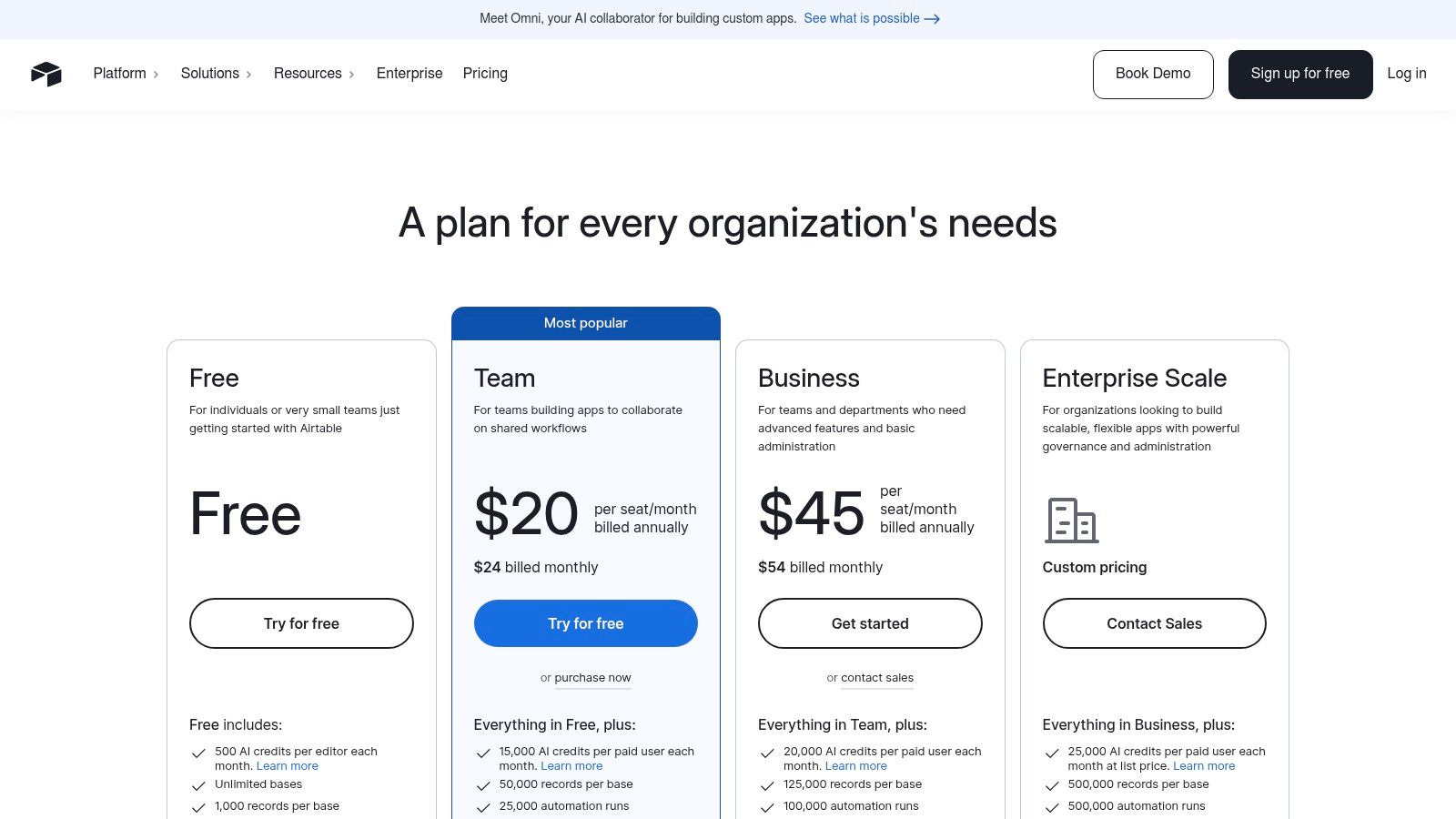
Unlike traditional databases that can be rigid and intimidating, Airtable uses a system of "bases" (databases) and "tables" that can be linked relationally. This structure is enhanced with rich field types like checkboxes, file attachments, and dropdowns. Its standout feature is the ability to view the same data in multiple formats, including a grid, calendar, Kanban board, or Gantt chart, catering to different team needs and project management styles. This adaptability makes it a superior alternative to spreadsheets for dynamic, collaborative work.
Key Features & Use Cases
Airtable's approachable design and powerful features make it a versatile tool for centralizing business information and automating processes. It excels at creating a single source of truth for various operational needs.
- Best For: Project management, content creation pipelines, simple CRMs, marketing campaign tracking, and building no-code internal tools.
- Multiple Views: Instantly switch between Grid, Kanban, Gantt, and Calendar views to visualize data in the most effective way for your task.
- Interface Designer: Build custom visual interfaces and dashboards on top of your data, allowing team members to interact with information without needing to navigate the entire database.
- Automations & Extensions: Create automated workflows between Airtable and other apps (like Slack or Mailchimp) and add functionality with Extensions (like charts, maps, and page designers).
Pricing and Access
Airtable offers a robust free plan with generous limits suitable for individuals or very small teams. Paid plans start with the Team tier at $20/seat/month (billed annually), which increases record limits, storage, and automation runs.
Website: https://airtable.com/pricing
5. Zoho Creator
Zoho Creator empowers small businesses to build and deploy custom database applications with minimal coding, making it a standout low-code platform. It excels at transforming data management processes into streamlined, multi-platform apps that can run on the web, iOS, and Android devices. This is ideal for creating tailored solutions for unique business workflows, such as client portals, event management systems, or custom order trackers, without needing a dedicated development team. Its key differentiator is the drag-and-drop interface combined with powerful customization options.
As part of the extensive Zoho suite, Creator offers deep, seamless integration with other Zoho products like CRM, Books, and Desk. This creates a cohesive and powerful ecosystem where data flows effortlessly between different business functions. For companies already using Zoho tools, Creator is a natural extension for building bespoke applications that fill operational gaps, making it one of the best database software for small business owners seeking an all-in-one solution.
Key Features & Use Cases
Zoho Creator’s flexibility allows it to adapt to nearly any custom business requirement, from simple data collection forms to complex, automated workflows with integrated analytics.
- Best For: Creating custom business apps, automating workflows, and building mobile-friendly data collection tools.
- Low-Code App Builder: Visually design your database application's interface, logic, and workflows using drag-and-drop tools.
- Deluge Scripting: For advanced customization, use Deluge, Zoho's proprietary scripting language, to add complex business logic and automation.
- Extensive Integrations: Connect your custom apps to over 650 business applications, including non-Zoho services like Slack and QuickBooks.
Pricing and Access
Zoho Creator offers a competitive pricing model, including a free plan for a single user. Paid plans start at $8/user/month (billed annually), with higher tiers offering more features and capacity. This scalability makes it accessible for startups and growing businesses alike.
Website: https://www.zoho.com/creator/
6. Quickbase
Quickbase is a powerful low-code platform designed for businesses that need to build custom, secure, and scalable database applications without extensive coding. It excels at transforming operational processes into dynamic workflows, making it ideal for managing complex projects, tracking assets, or streamlining client-facing services. Its core strength lies in empowering business users, not just developers, to create and modify applications that perfectly fit their unique operational needs, moving beyond the limitations of standard spreadsheets or rigid off-the-shelf software.
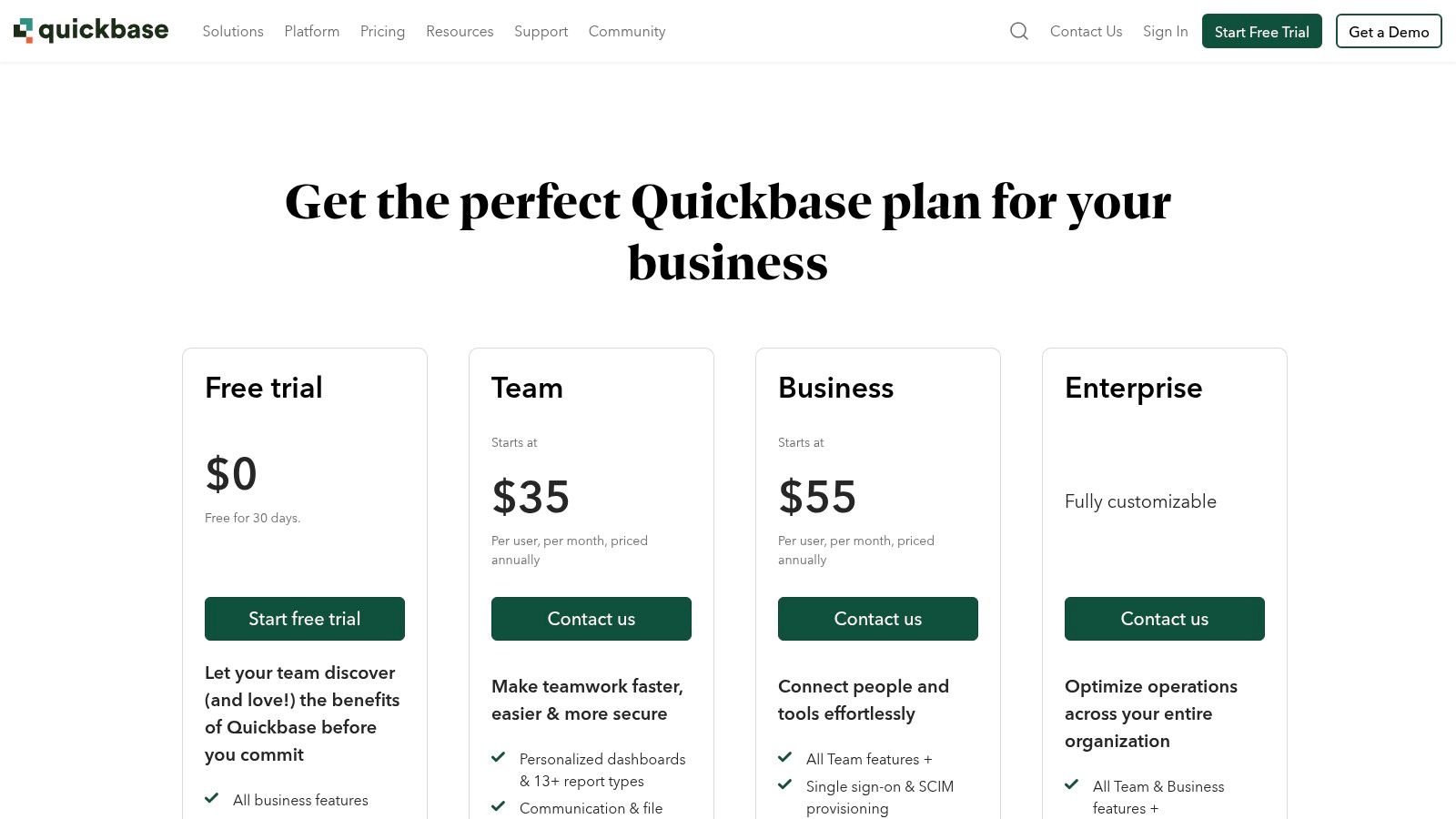
This platform provides a centralized hub where teams can collaborate on data, automate tasks, and gain real-time insights through customizable dashboards and reports. For small businesses in regulated industries or those handling sensitive information, Quickbase offers enterprise-grade governance and security features that ensure data integrity and compliance, making it a reliable choice as one of the best database software for small business operations that require robust controls.
Key Features & Use Cases
Quickbase is highly adaptable, serving businesses that need to manage everything from simple lists to sophisticated departmental solutions with complex interdependencies.
- Best For: Operations management, project tracking, CRM, and building custom business apps for regulated industries (e.g., healthcare, finance).
- Low-Code App Builder: Create applications with custom forms, reports, and interactive dashboards using a visual, drag-and-drop interface.
- Automation Pipelines: Automate multi-step workflows and integrate data between Quickbase apps and third-party services like Salesforce, Slack, or NetSuite.
- Enterprise-Grade Security: Includes features like SSO/SCIM, fine-grained audit logs, and sandboxing environments. Options for HIPAA and FDA compliance are available.
Pricing and Access
Quickbase offers flexible licensing with both seat-based and usage-based plans available. Pricing for the Team plan starts at $35/user/month, but platform minimums apply. Larger teams may benefit from professional onboarding assistance to properly architect their initial applications for maximum efficiency.
Website: https://www.quickbase.com/plans-and-pricing
7. Amazon Web Services – Amazon RDS
For small businesses ready to leverage the power of the cloud, Amazon Relational Database Service (RDS) offers a managed solution that removes the administrative overhead of running a database. Instead of managing servers, patching software, or configuring backups, RDS handles these tasks automatically. This allows a small team to deploy a production-ready database like MySQL, PostgreSQL, or SQL Server in minutes, focusing their resources on application development rather than infrastructure maintenance.
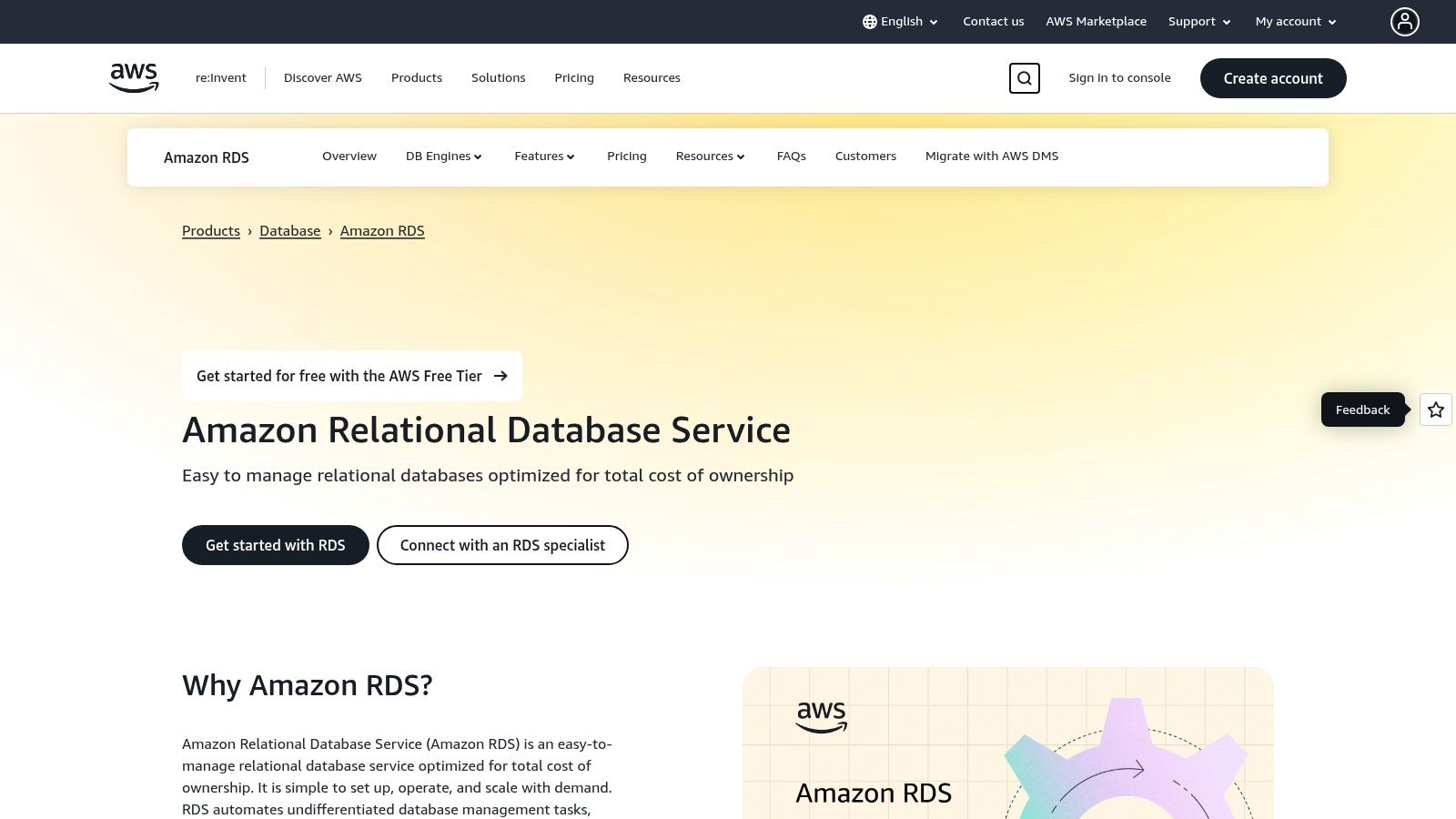
Its key advantage is scalability and reliability. As your business grows, you can easily increase your database's compute power or storage with minimal downtime. Features like automated backups and multi-region availability provide a level of data security and disaster recovery that is often out of reach for a small business managing its own hardware. To ensure optimal performance and security for your Amazon RDS instances, staying informed about the latest platform enhancements is crucial, and subscribing to weekly AWS database updates can provide valuable insights.
Key Features & Use Cases
Amazon RDS is one of the best database software for small business options when you need a powerful, managed, and scalable backend for web applications or internal systems.
- Best For: Hosting databases for websites, mobile apps, and SaaS products that require high availability and scalability without manual server management.
- Multiple Database Engines: Supports popular open-source (MySQL, PostgreSQL, MariaDB) and commercial (Oracle, SQL Server) database engines.
- Automated Management: Handles provisioning, patching, backup, recovery, and failure detection automatically.
- High Availability: Easily configure Multi-AZ deployments for enhanced availability and data durability during system maintenance or failures.
Pricing and Access
Amazon RDS operates on a pay-as-you-go model, with costs determined by the instance size, storage, data transfer, and selected features. An AWS Free Tier is available, providing a small RDS instance for free for 12 months, allowing businesses to start without an initial investment.
Website: https://aws.amazon.com/rds/
8. Google Cloud – Cloud SQL
For small businesses building applications or analytics platforms on the cloud, Google Cloud SQL offers a fully managed, serverless-like experience for popular relational databases. It removes the operational burden of patching, backups, and managing infrastructure for MySQL, PostgreSQL, and SQL Server instances. This allows developers to focus on building applications rather than performing database administration, making it a powerful choice for tech-savvy businesses that need a reliable, scalable backend without the overhead of a dedicated DBA.
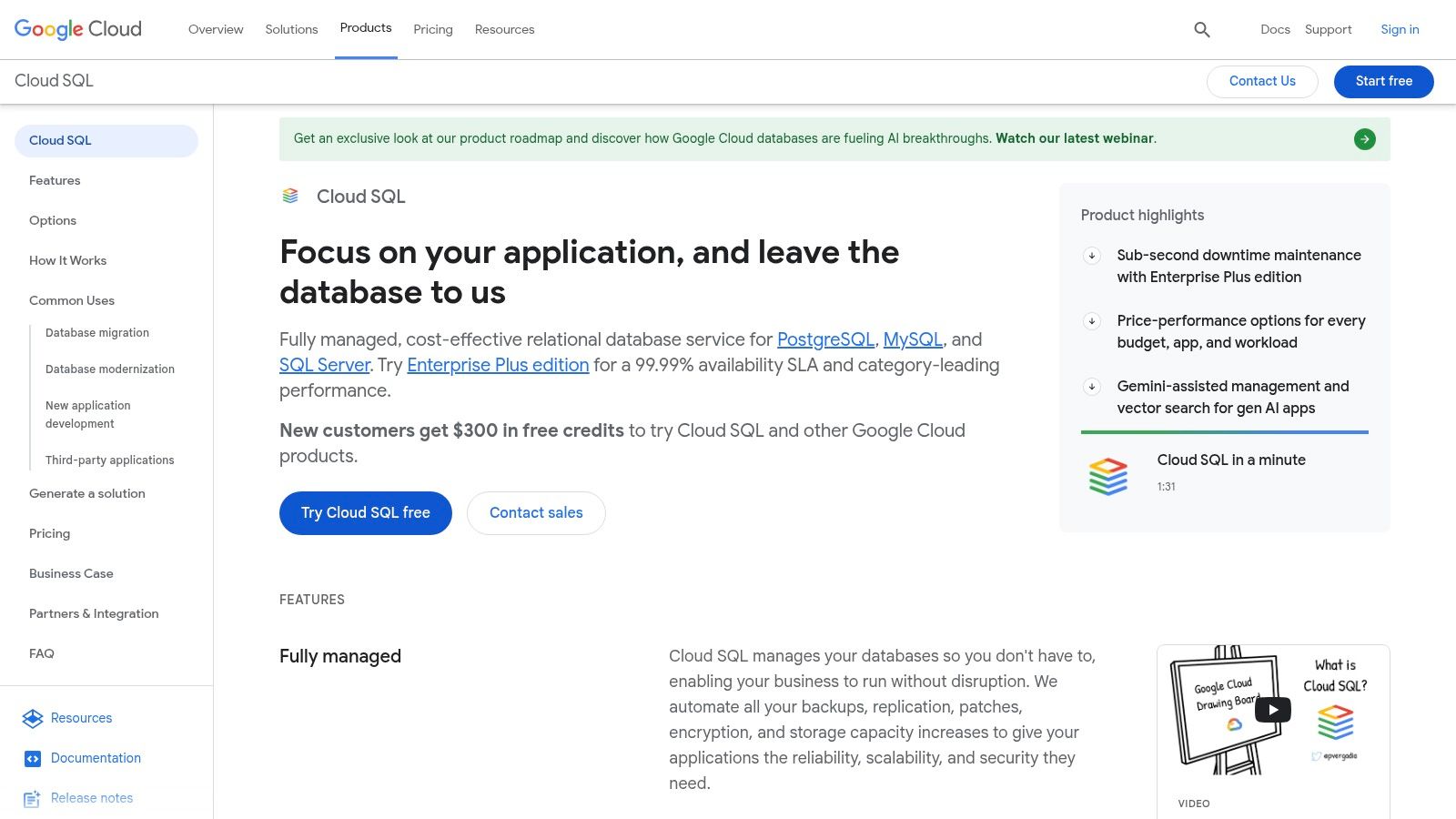
Its key advantage is the deep integration with the Google Cloud Platform (GCP) ecosystem. You can easily connect your database to services like Google Kubernetes Engine, App Engine, and BigQuery for advanced analytics. This tight coupling simplifies data pipelines and reduces latency, providing a seamless experience for developing and deploying cloud-native applications. This makes it one of the best database software for small business teams already invested in or planning to use GCP.
Key Features & Use Cases
Cloud SQL provides the power of a traditional RDBMS with the convenience and scalability of the cloud, ideal for businesses building web applications or data-driven services.
- Best For: Powering web applications, mobile app backends, and as a data source for business intelligence tools within the Google Cloud ecosystem.
- Fully Managed Service: Automates backups, replication, patches, and updates, ensuring high availability and reliability.
- Scalability: Easily scale instances up with more vCPUs and RAM or scale out with read replicas to handle increased traffic.
- Security: Offers robust security with Virtual Private Cloud (VPC) integration, IAM database authentication, and encryption at rest and in transit.
Pricing and Access
Pricing is based on a pay-as-you-go model for vCPU, memory, and storage, providing flexibility to start small and scale. Google offers a generous free tier and a $300 credit for new customers to experiment with the platform. While this model is cost-effective, estimating monthly costs can be complex.
Website: https://cloud.google.com/sql
9. Microsoft Azure – Azure SQL Database
For small businesses outgrowing desktop solutions like Access or needing a robust, scalable cloud database, Microsoft's Azure SQL Database is a logical next step. As a fully managed Platform as a Service (PaaS), it handles the complex infrastructure management, including updates, patching, backups, and monitoring, allowing you to focus on your application and data. It provides the power and familiarity of SQL Server without the overhead of managing a physical server.
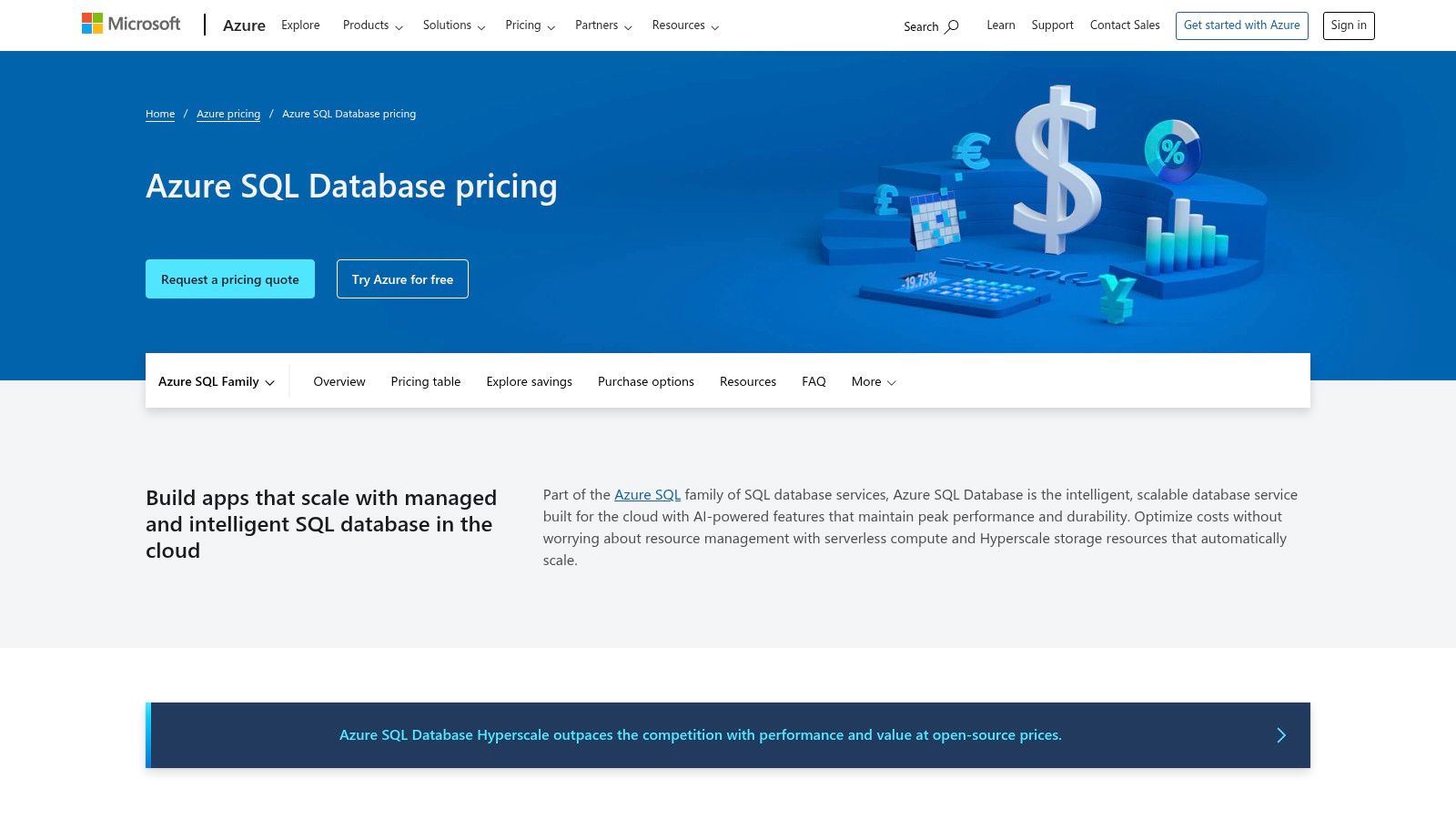
This service is particularly advantageous for businesses already operating within the Microsoft ecosystem, such as those using .NET for development or relying on Microsoft 365. Its serverless compute tier is a major benefit for SMBs with intermittent or unpredictable workloads, as it can automatically pause the database when inactive to save costs and resume instantly when needed. This makes it one of the most cost-effective and best database software for small business applications that need to scale on demand.
Key Features & Use Cases
Azure SQL Database offers enterprise-grade security and performance features tailored for cloud applications, from simple websites to complex business intelligence tools.
- Best For: Web and mobile app backends, migrating on-premise SQL Server databases, and businesses needing a scalable, managed cloud database.
- Serverless Tier: An intelligent, cost-optimized option where compute resources are automatically scaled and can be paused during periods of inactivity.
- Built-in Intelligence: Features like automatic tuning and threat detection optimize performance and enhance security without manual intervention.
- High Availability: Offers built-in high availability, backups, and geo-replication to ensure your data is safe and your application remains online.
Pricing and Access
Pricing for Azure SQL Database is flexible, based on a vCore or DTU purchasing model with several service tiers (General Purpose, Business Critical, Hyperscale). The serverless option is particularly attractive for small businesses, as you only pay for the compute used per second. While the pricing matrix can be complex, it allows for precise resource allocation to match your budget and performance needs.
Website: https://azure.microsoft.com/en-us/pricing/details/azure-sql-database/
10. MySQL
MySQL is arguably the world's most popular open-source relational database, making it a cornerstone for countless web applications and backend systems. For small businesses with technical expertise, it offers an incredibly powerful, stable, and cost-effective foundation for everything from a company website's backend to custom business applications. Its strength lies in its proven performance, reliability, and the massive community supporting it, which ensures a wealth of documentation, tutorials, and third-party tools are readily available.
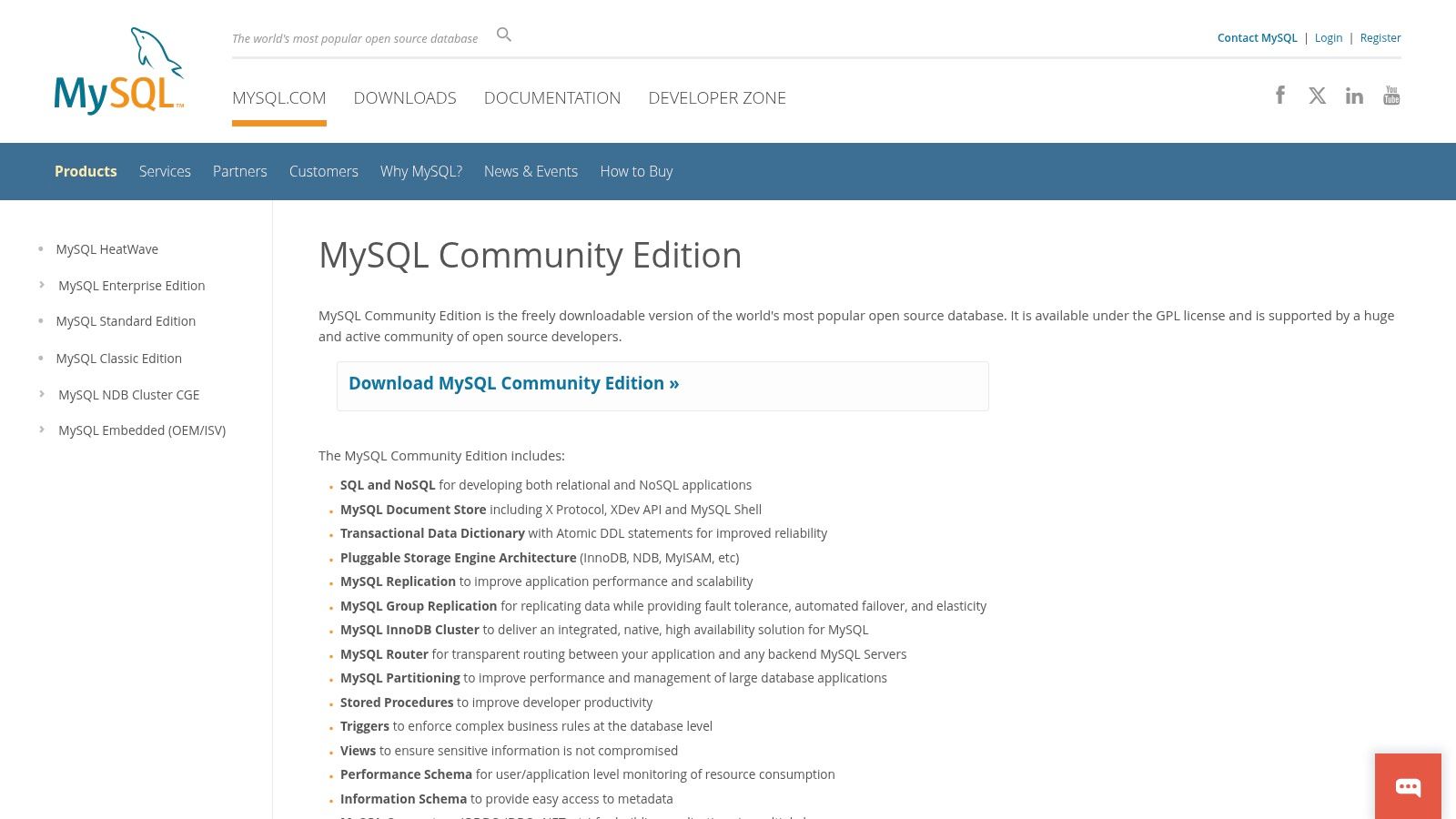
As a mature relational database management system (RDBMS), MySQL provides robust features like the InnoDB storage engine for transactional integrity and high availability through replication. While self-hosting requires significant technical skill for setup, security, and maintenance, managed MySQL services from cloud providers like Amazon RDS, Google Cloud SQL, or DigitalOcean offer a much lower barrier to entry. This flexibility makes it a versatile piece of database software for small business needs that can scale from a simple project to a high-traffic application.
Key Features & Use Cases
MySQL is a workhorse database suitable for a wide range of applications, especially those built on the popular LAMP (Linux, Apache, MySQL, PHP/Python/Perl) stack.
- Best For: Web application backends, e-commerce platforms, content management systems (like WordPress), and custom business logic that requires a reliable relational database.
- MySQL Workbench: A unified visual tool for database architects, developers, and DBAs to design, model, and manage databases.
- Broad Connectivity: Offers extensive driver support (ODBC, JDBC, .NET), allowing it to connect with virtually any application or programming language.
- Scalability: Supports various replication setups to scale read operations and ensure high availability as your business grows.
Pricing and Access
The MySQL Community Edition is completely free to download and use, with no licensing costs. The primary costs are associated with the hardware for self-hosting or the subscription fees for managed cloud database services. Paid enterprise editions with advanced features and official support are also available from Oracle.
Website: https://www.mysql.com/products/community/
11. PostgreSQL
PostgreSQL is a powerful, open-source object-relational database system that offers enterprise-grade features without any licensing fees. For small businesses with technical expertise, it provides a highly scalable and robust foundation for complex applications, from transactional systems to data warehousing. It's renowned for its strong adherence to SQL standards, reliability, and data integrity, making it a go-to choice for developers building custom software solutions.
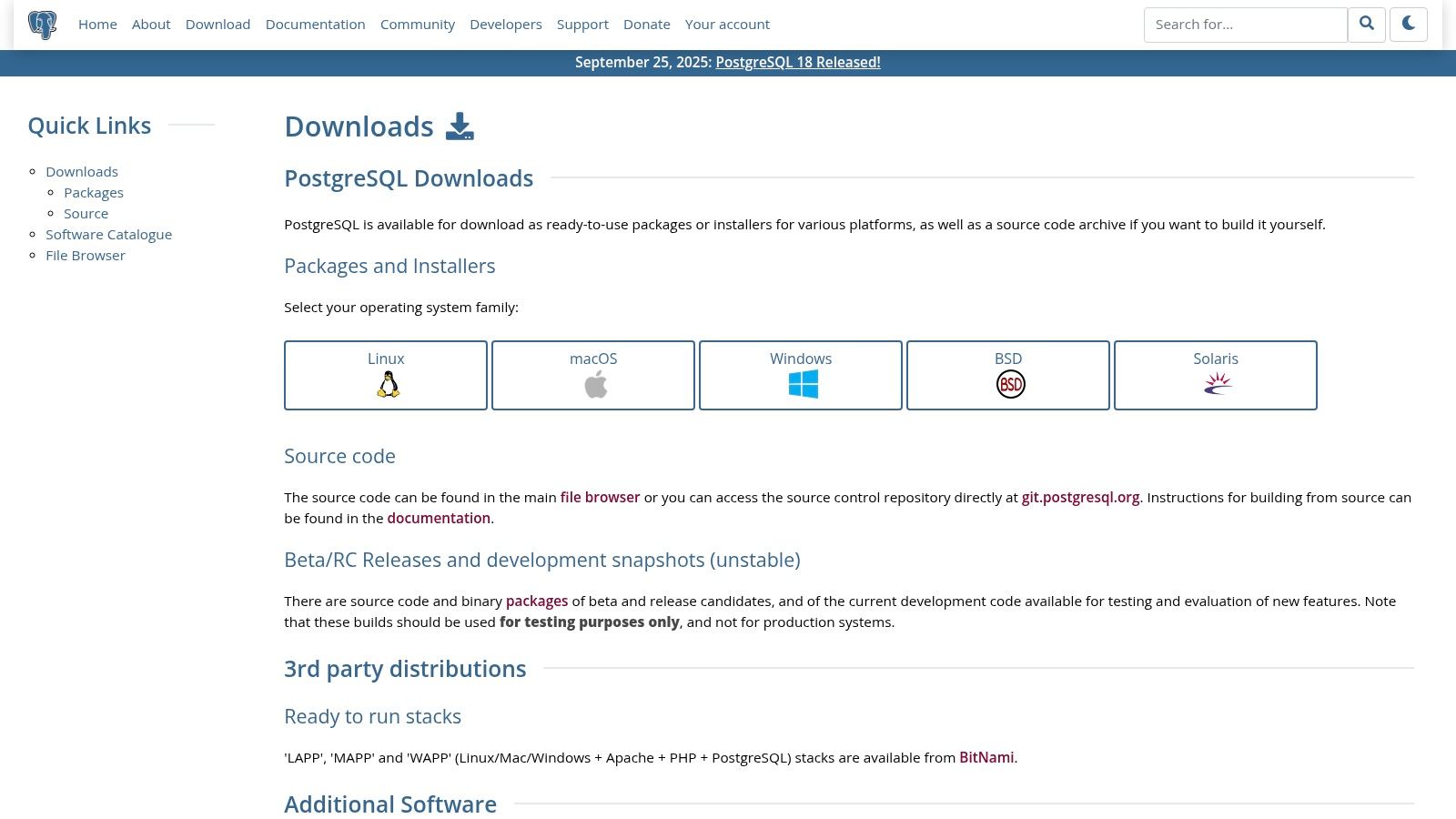
Unlike many simpler databases, PostgreSQL supports advanced data types like JSONB for flexible, schema-less data alongside traditional structured data. This versatility allows it to power modern web applications, analytics platforms, and geospatial services (with the PostGIS extension). While it requires more setup and maintenance than a managed service, its performance and feature set rival expensive commercial databases, making it some of the best database software for small business teams aiming for long-term growth.
Key Features & Use Cases
PostgreSQL's extensibility and stability make it suitable for a wide range of mission-critical applications where data accuracy is paramount.
- Best For: Custom application backends, data analytics, geospatial applications, and businesses needing a highly customizable, free database.
- ACID Compliance: Guarantees transactional integrity, ensuring that database operations are processed reliably.
- Advanced Indexing: Offers a variety of indexing methods (B-tree, Hash, GiST, GIN) to optimize query performance for different workloads.
- Extensive Extensibility: A rich ecosystem of extensions, like PostGIS for geographic data, allows you to add new functionalities without modifying the core code.
- Multi-Version Concurrency Control (MVCC): Allows multiple users to read and write to the database simultaneously with minimal locking conflicts.
Pricing and Access
PostgreSQL is completely free and open-source, with no licensing costs for its use. The primary costs are associated with the hardware (or cloud services) it runs on and the technical expertise required for its administration, monitoring, and maintenance.
Website: https://www.postgresql.org/download/
12. Capterra – Database Software Category
Rather than a single software, Capterra’s Database Software Category is a comprehensive marketplace that helps small businesses discover and compare the best database software for their specific needs. It serves as an invaluable research tool, allowing you to filter through hundreds of options based on features, pricing models, deployment type, and user ratings. This approach saves countless hours of manual research, presenting a curated list of potential solutions side-by-side. For a small business owner who isn't a database expert, Capterra provides the context needed to make an informed decision.
The platform aggregates verified user reviews, offering honest insights into the pros and cons of each tool from the perspective of real-world business users. This peer-reviewed information is often more practical than marketing materials, highlighting potential implementation challenges or standout features that vendors may not emphasize. Capterra effectively demystifies the software selection process, making it an essential first stop before committing to a specific database solution.
Key Features & Use Cases
Capterra excels at helping you navigate the complex market of database tools to find the perfect fit for your operational requirements and budget.
- Best For: Researching and comparing multiple database solutions, creating a shortlist of vendors, and reading verified user reviews.
- Advanced Filtering: Narrow down options by essential features like access controls, data migration, reporting, and more.
- Vendor Comparisons: See detailed, side-by-side comparisons of top contenders based on ratings, features, and pricing structures.
- Buyer Guides: Access articles and guides that explain key database concepts and help you define your business requirements before you start your search.
Pricing and Access
Capterra is completely free for users. The platform is supported by software vendors who pay for placement and lead generation. While sponsored listings are present, they are clearly marked, and the core filtering and review functionalities remain unbiased.
Website: https://www.capterra.com/database-management-software/
Top 12 Database Software Comparison
| Product | Core Features/Characteristics | User Experience/Quality ★ | Value Proposition 💰 | Target Audience 👥 | Unique Selling Points ✨ |
|---|---|---|---|---|---|
| 🏆 NotionSender | Email integration inside Notion; AI email parsing; automation | ★★★★☆ User-friendly in Notion environment | 💰 Mid-range, productivity boost | 👥 Notion users, SMBs, professionals | ✨ Native email in Notion; unique DB emails; automation templates |
| Microsoft Access | Desktop DB with forms, reports, VBA automation | ★★★★☆ Mature but Windows-only | 💰 Included in MS365/subscription | 👥 Small teams on Windows | ✨ Rich MS Office integration; local PC apps |
| Claris FileMaker | Low-code app builder, cross-platform, cloud/on-prem | ★★★★ Stable and customizable | 💰 Higher, annual licenses | 👥 SMBs needing custom apps | ✨ Visual app design; cloud or self-hosted options |
| Airtable | Cloud DB-spreadsheet hybrid; multi-view; APIs | ★★★★ Easy for non-tech users | 💰 Freemium with paid tiers | 👥 Teams needing collaboration | ✨ Multiple views and automation; strong templates |
| Zoho Creator | Low-code, drag & drop, multi-platform deployment | ★★★★ Good ecosystem integration | 💰 Competitive, per user pricing | 👥 SMBs in Zoho ecosystem | ✨ Over 650 app integrations; Deluge scripting |
| Quickbase | Low-code, enterprise-ready; secure; compliance options | ★★★★ Strong governance and scalability | 💰 Seat or usage-based pricing | 👥 Regulated SMBs needing complex apps | ✨ HIPAA/FDA compliance; flexible licensing |
| Amazon Web Services – Amazon RDS | Managed relational DB, multi-engine support, automated ops | ★★★★★ Production-ready, broad AWS ecosystem | 💰 Variable, complex cost model | 👥 Large-scale, cloud-savvy enterprises | ✨ Multi-engine, high availability, AWS integrations |
| Google Cloud – Cloud SQL | Managed MySQL/PostgreSQL/SQL Server; HA; GCP native integration | ★★★★ Easy management with Google Cloud services | 💰 Pay-as-you-go, includes credits | 👥 Cloud users seeking managed DB | ✨ Serverless-like; $300 credits for new users |
| Microsoft Azure – Azure SQL Database | Managed SQL, serverless, multiple purchasing models | ★★★★ Microsoft ecosystem optimized | 💰 Complex pricing; serverless saves cost | 👥 Microsoft-heavy environments | ✨ Hyperscale, auto-pause/resume, AD integration |
| MySQL | Open-source RDBMS, broad platform support, mature | ★★★★ Large community; free community edition | 💰 Free community, paid support | 👥 Developers and SMBs requiring open source | ✨ Widest adoption; free with enterprise options |
| PostgreSQL | Advanced open-source RDBMS; rich extensions; scalable | ★★★★★ Enterprise-grade, no licensing fees | 💰 Free open source | 👥 SMBs to large enterprises | ✨ Extensibility (JSONB, PostGIS); strong SQL compliance |
| Capterra – Database Software Category | Buyer guides, reviews, comparisons | ★★★☆☆ User reviews based | 💰 Free research tool | 👥 Businesses evaluating DB software | ✨ Comprehensive vendor data and ratings |
Final Thoughts
Navigating the landscape of database software can feel overwhelming, but making an informed decision is one of the most impactful technology choices a small business can make. Throughout this guide, we've explored a diverse range of options, from user-friendly no-code platforms like Airtable and Zoho Creator to robust, scalable solutions such as PostgreSQL and Amazon RDS. The central lesson is clear: the best database software for your small business isn't a one-size-fits-all answer, but rather the tool that most closely aligns with your unique operational needs, technical capabilities, and future growth plans.
Your journey to find the perfect fit begins with a thorough self-assessment. Are you looking to build a simple, visual customer relationship manager (CRM), or do you need a powerful backend to support a custom application? Is your team composed of non-technical users who need an intuitive interface, or do you have development resources ready to manage a more complex SQL database? Answering these questions honestly will immediately narrow down your options and point you toward the right category of software.
Key Takeaways and Actionable Next Steps
To distill our comprehensive analysis into a practical roadmap, consider these final points before making your investment:
- No-Code vs. Traditional Databases: For most small businesses focused on internal process management, project tracking, or simple data organization, no-code platforms like Airtable, Claris FileMaker, and Quickbase offer the fastest path to value. They minimize the need for specialized technical skills and empower your team to build custom solutions quickly. In contrast, if your business is developing a software product or needs to handle massive datasets with complex queries, a traditional SQL database like MySQL or PostgreSQL is the more appropriate, long-term choice.
- The Cloud Advantage: Cloud-based solutions such as Amazon RDS, Google Cloud SQL, and Microsoft Azure SQL provide unparalleled scalability, reliability, and reduced maintenance overhead. They allow you to pay for what you use and scale resources up or down as your business evolves, making them a financially prudent choice for growing companies. However, this flexibility comes with a learning curve and requires a foundational understanding of cloud infrastructure.
- Start with a Pilot Project: Instead of migrating your entire operation at once, identify a single, specific pain point to solve. Use a free trial or a low-cost plan to build a small-scale pilot solution. For example, you could create a simple inventory tracker in Airtable or a project management dashboard in Zoho Creator. This hands-on experience is the most effective way to evaluate a platform's suitability for your team's workflow and skill set.
Final Implementation Considerations
Once you've selected a tool, successful implementation is the next critical phase. Remember to prioritize data security from day one. As you centralize sensitive customer and business data, it's vital to pair your new database with a comprehensive cybersecurity strategy to protect your valuable information from threats.
Furthermore, invest in team training. The most powerful software is useless if your team doesn't know how to leverage its features. Allocate time for onboarding and encourage key team members to become "champions" of the new system, providing support and driving adoption across the organization. By carefully selecting a tool that fits your specific context and thoughtfully managing its rollout, you can transform your data from a simple collection of records into a strategic asset that fuels smarter decisions and sustainable growth.
Ready to turn your Notion workspace into a powerful business hub? If you're building your business processes in Notion, enhance its capabilities with NotionSender. Our tool allows you to send and receive emails directly within your Notion pages, transforming your database into a fully functional communication and client management system. Visit NotionSender to see how you can streamline your workflows and manage everything in one place.
